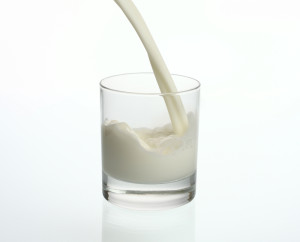 So, cow’s milk is off the menu at your place. Perhaps your child has been diagnosed with an allergy or intolerance, your children hate the taste, or there’s another reason you’ve decided to go dairy-free (be sure to get expert advice and guidance from your GP or nutritionist before completely eliminating any foods from your family’s diet, including yours and your kids’). Now, you’re weighing up the pros and cons of other milks on the market. Here’s a rundown on where to start your search.
So, cow’s milk is off the menu at your place. Perhaps your child has been diagnosed with an allergy or intolerance, your children hate the taste, or there’s another reason you’ve decided to go dairy-free (be sure to get expert advice and guidance from your GP or nutritionist before completely eliminating any foods from your family’s diet, including yours and your kids’). Now, you’re weighing up the pros and cons of other milks on the market. Here’s a rundown on where to start your search.
Blog
When Can My Baby Eat Fish and Other Seafood?
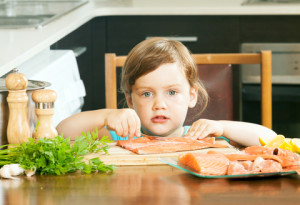 Working out when to introduce your baby to fish and seafood can be a little puzzling. Advice in the past has been to start with things like rice cereal, apple, pear and pumpkin, and wait until your baby reaches seven months of age, then eight months and so on, to add particular foods (particularly things like egg, wheat and fish) to his diet. However, recent Australian guidelines state that you can introduce your baby to foods in any order you choose, providing iron-rich and nutritious foods are given priority. These include iron-fortified baby cereals, lentils, lean red meat and poultry.
Working out when to introduce your baby to fish and seafood can be a little puzzling. Advice in the past has been to start with things like rice cereal, apple, pear and pumpkin, and wait until your baby reaches seven months of age, then eight months and so on, to add particular foods (particularly things like egg, wheat and fish) to his diet. However, recent Australian guidelines state that you can introduce your baby to foods in any order you choose, providing iron-rich and nutritious foods are given priority. These include iron-fortified baby cereals, lentils, lean red meat and poultry.
How To Freeze Breast Milk in Qubies
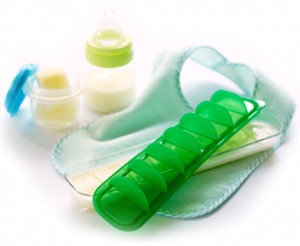 There are a few reasons you may need or want to express your breast milk and pop it in the freezer for later use. Perhaps you need to relieve engorgement in the early days or discomfort after an incomplete feed, or possibly you’re planning to be away from your baby and need to plan ahead with milk feeds ready to go in the freezer. Whatever the purpose, here are things you might want to keep in mind when freezing your breast milk – and tips on using Qubies freezer trays to do it.
There are a few reasons you may need or want to express your breast milk and pop it in the freezer for later use. Perhaps you need to relieve engorgement in the early days or discomfort after an incomplete feed, or possibly you’re planning to be away from your baby and need to plan ahead with milk feeds ready to go in the freezer. Whatever the purpose, here are things you might want to keep in mind when freezing your breast milk – and tips on using Qubies freezer trays to do it.
When Can My Baby Start Eating Meat?
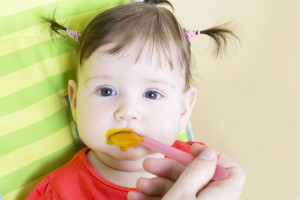 Ensuring your little one gets her daily intake of iron can be tricky. From birth to six months, your baby will use her own iron stores from when she was in the womb, and from your breast milk if you are breastfeeding or from infant formula. After that, her iron stores will start to deplete, which means it is your job to ensure that her recommended iron and nutrient levels are restored daily to help with healthy growth and brain development.
Ensuring your little one gets her daily intake of iron can be tricky. From birth to six months, your baby will use her own iron stores from when she was in the womb, and from your breast milk if you are breastfeeding or from infant formula. After that, her iron stores will start to deplete, which means it is your job to ensure that her recommended iron and nutrient levels are restored daily to help with healthy growth and brain development.
Immune-Boosting Winter Superfoods For Your Family
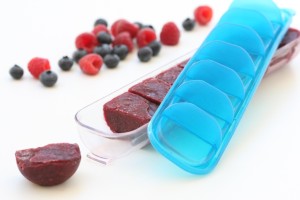 Winter is just around the corner, and there’s nothing like the onset of a cold to get you thinking about eating better to fight off flus. A diet of immune-boosting superfoods will work wonders to keep those sneezes at bay. And luckily, there are an array of fresh fruits and vegetables packed with good-for-you nutrients that’ll keep you and your family on track this winter. Here are a few that are currently in season, so they’ll be friendly to your body as well as your wallet.
Winter is just around the corner, and there’s nothing like the onset of a cold to get you thinking about eating better to fight off flus. A diet of immune-boosting superfoods will work wonders to keep those sneezes at bay. And luckily, there are an array of fresh fruits and vegetables packed with good-for-you nutrients that’ll keep you and your family on track this winter. Here are a few that are currently in season, so they’ll be friendly to your body as well as your wallet.
Four Fuss-Free Super Soups
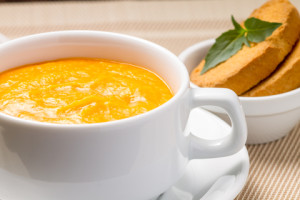 As winter sets in, there’s nothing better than heading home on a dreary night to a hearty soup to warm you up. It’s super simple to make homemade soup, too, and even easier to store in a pouch or freezer tray as a make-ahead meal for the whole family, babies included. Here are four easy and freezer-friendly soups to keep everyone happy all winter long.
As winter sets in, there’s nothing better than heading home on a dreary night to a hearty soup to warm you up. It’s super simple to make homemade soup, too, and even easier to store in a pouch or freezer tray as a make-ahead meal for the whole family, babies included. Here are four easy and freezer-friendly soups to keep everyone happy all winter long.
Food For Qubies Reusable Pouches
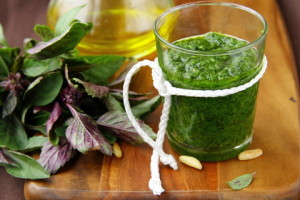 Everybody wishes they had more time to prepare honest healthy food, but unless you have a personal chef waiting for you at home, finding the time to cook these meals – not to mention cleaning up afterwards! – can be a challenge. Making ahead, freezing and reheating are your best options for quick, no fuss, and on-the-go nourishing meals and snacks – and reusable pouches are perfect for storing, reheating and serving some delicious ideas.
Everybody wishes they had more time to prepare honest healthy food, but unless you have a personal chef waiting for you at home, finding the time to cook these meals – not to mention cleaning up afterwards! – can be a challenge. Making ahead, freezing and reheating are your best options for quick, no fuss, and on-the-go nourishing meals and snacks – and reusable pouches are perfect for storing, reheating and serving some delicious ideas.
Is Your Child Eating Enough?
 Unless you’re blessed with a ravenous eater, with a healthy appetite and gorgeous little eyes that strain to see over the rim of the plate at what else you have in store today, chances are you’ve asked yourself – probably more than once – is my baby or toddler actually eating enough? When faced with fussy faces, food refusal and a floor full of tonight’s delicious dinner, it’s understandable to be concerned about what’s actually making it into your little one’s tummy. Here’s how to find peace of mind with what your kids are eating.
Unless you’re blessed with a ravenous eater, with a healthy appetite and gorgeous little eyes that strain to see over the rim of the plate at what else you have in store today, chances are you’ve asked yourself – probably more than once – is my baby or toddler actually eating enough? When faced with fussy faces, food refusal and a floor full of tonight’s delicious dinner, it’s understandable to be concerned about what’s actually making it into your little one’s tummy. Here’s how to find peace of mind with what your kids are eating.
Measure no more
When it’s just milk feeds and cubes of puree on the menu, it’s easy to measure input against output and evaluate the appropriate quantities of your baby’s meals. As time goes on, it gets harder to see what’s actually going in – with snacking here and skipping dinner there, it turns into quite the guessing game! Instead, offer lots of healthy choices at all times – grains, vegetables, fruit, protein and dairy – and feel good knowing your child has access to a variety of good-for-her foods. Some days the bread will be the clear winner, other days the carrots, and that’s okay.
Don’t fight it
Try not to turn meal times into battles. It may be difficult, but aim to give fussy behaviour as little attention as possible. Make some ground rules about eating – this is what’s on your plate today, so just have a try then take it or leave it! – and resist the urge to prepare multiple meals to please everyone in the home. Stay matter-of-fact about food and you’ll hopefully create better eaters. And remember, if they are hungry they will eat!
Think small
Three big meals a day may not be the best way to go. Consider down-sizing the portions and offering lots of small meals and snacks throughout the day. Toddlers are often too busy to sit down and eat, but a plate left out for them to graze as they go, can be a smart way to fill their bellies. Good ideas for grazing foods include toast and sandwich soldiers, fruit and vegie sticks, dried fruits, pieces of cheese, strips of meat, pieces of omelette, pancakes and pikelets, mini muffins, wedges of frittata, crackers with avocado and pasta shapes.
Ask yourself these questions
Still not confident your child is eating enough? Answer these questions: Are you offering a good variety of healthy foods every day? Is he growing as he should? And is he generally happy, active and well? Your responses should give you a good indication of whether your child is meeting his nutritional needs and satisfying his appetite. If in doubt, talk to your GP.
All About Baby Food Labels
When Will My Toddler Use A Fork?
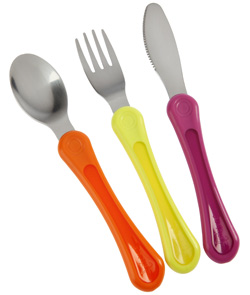 So your little baby isn’t so little anymore, and she’s decided that hey, enough is enough – it’s time she fed herself! This may happen as early as 12 or 13 months, but some littlies will be much older. The transition from spoon-feeding your toddler to letting her take care of it herself is a long (and messy) one, but there are things you can do to help make the change a positive and relatively pain-free one for both of you.
So your little baby isn’t so little anymore, and she’s decided that hey, enough is enough – it’s time she fed herself! This may happen as early as 12 or 13 months, but some littlies will be much older. The transition from spoon-feeding your toddler to letting her take care of it herself is a long (and messy) one, but there are things you can do to help make the change a positive and relatively pain-free one for both of you.
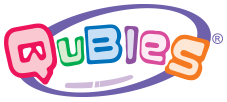
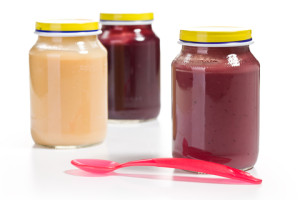 How closely do you look at the labels on pre-packaged baby food – and do you know what you’re looking for, really? Here’s the lowdown on what to make of those baby food labels.
How closely do you look at the labels on pre-packaged baby food – and do you know what you’re looking for, really? Here’s the lowdown on what to make of those baby food labels.